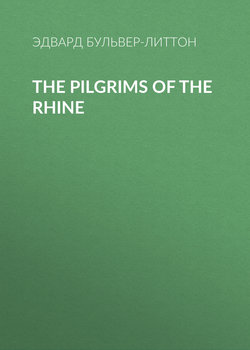Читать книгу The Pilgrims of the Rhine - Эдвард Джордж Бульвер-Литтон, Эдвард Бульвер-Литтон - Страница 3
PREFACE
ОглавлениеWITH the younger class of my readers this work has had the good fortune to find especial favour; perhaps because it is in itself a collection of the thoughts and sentiments that constitute the Romance of youth. It has little to do with the positive truths of our actual life, and does not pretend to deal with the larger passions and more stirring interests of our kind. It is but an episode out of the graver epic of human destinies. It requires no explanation of its purpose, and no analysis of its story; the one is evident, the other simple,—the first seeks but to illustrate visible nature through the poetry of the affections; the other is but the narrative of the most real of mortal sorrows, which the Author attempts to take out of the region of pain by various accessories from the Ideal. The connecting tale itself is but the string that binds into a garland the wild-flowers cast upon a grave.
The descriptions of the Rhine have been considered by Germans sufficiently faithful to render this tribute to their land and their legends one of the popular guide-books along the course it illustrates,—especially to such tourists as wish not only to take in with the eye the inventory of the river, but to seize the peculiar spirit which invests the wave and the bank with a beauty that can only be made visible by reflection. He little comprehends the true charm of the Rhine who gazes on the vines on the hill-tops without a thought of the imaginary world with which their recesses have been peopled by the graceful credulity of old; who surveys the steep ruins that overshadow the water, untouched by one lesson from the pensive morality of Time. Everywhere around us is the evidence of perished opinions and departed races; everywhere around us, also, the rejoicing fertility of unconquerable Nature, and the calm progress of Man himself through the infinite cycles of decay. He who would judge adequately of a landscape must regard it not only with the painter’s eye, but with the poet’s. The feelings which the sight of any scene in Nature conveys to the mind—more especially of any scene on which history or fiction has left its trace—must depend upon our sympathy with those associations which make up what may be called the spiritual character of the spot. If indifferent to those associations, we should see only hedgerows and ploughed land in the battle-field of Bannockburn; and the traveller would but look on a dreary waste, whether he stood amidst the piles of the Druid on Salisbury plain, or trod his bewildered way over the broad expanse on which the Chaldaean first learned to number the stars.
To the former editions of this tale was prefixed a poem on “The Ideal,” which had all the worst faults of the author’s earliest compositions in verse. The present poem (with the exception of a very few lines) has been entirely rewritten, and has at least the comparative merit of being less vague in the thought, and less unpolished in the diction, than that which it replaces.
